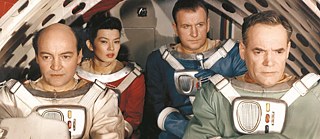Film
German Cinema 101: The Silent Star (Der schweigende Stern)

An introduction to the film will be provided by Peter Rollberg, Professor of Slavic Languages, Film Studies, and International Affairs at The George Washington University. A discussion will follow the screening.
German Democratic Republic / Polish People’s Republic, 1960, 93 min., Director: Kurt Maetzig. Screenplay: Jan Fethke, Wolfgang Kohlhaase, Kurt Maetzig, Günter Reisch, Günther Rücker, and Alexander Graf Stenbock-Fermor (based on the 1951 novel The Astronauts by Stanislaw Lem)
The year is 1985. During a massive construction undertaking to irrigate the Gobi Desert, a mysterious spool with magnetic properties is discovered by chance. When the team of engineers investigating the spool realizes it is made of extraterrestrial materials, an international team of scientists comes together to determine the spool’s origin. Ultimately convinced that the spool comes from Venus, the scientists embark on a dangerous mission to Venus in hopes of encountering its creators. Their discovery, however, becomes much more threatening than they had initially anticipated — especially when they learn that the existence of mankind is at stake. The first science-fiction film to emerge from both the German Democratic Republic and the Polish People’s Republic, The Silent Star (also released in the United States as First Spaceship on Venus) is both an imaginative speculation of the future during the Soviet era and a stark criticism of atomic warfare at the brink of the Cold War’s zenith.
Kurt Maetzig was born in 1911 in Berlin to a wealthy hanseatic merchant family. Although he initially set out to become a businessman like his father, Maetzig also pursued his interest in filmmaking. After the Nazis’ rise to power, Maetzig was denied work by the Nazi Reichskammer due to his Jewish heritage. By the end of World War II, he was an active member of the Communist Party in Berlin. He made some of the first films in Germany after the end of the war, and was one of the key people involved in founding the East German DEFA Film Studio. Maetzig directed more than 20 feature films before retiring in 1975. Many of his works were pioneer films of the Soviet era in some way; his first feature film, Marriage in the Shadows (1947), garnered critical acclaim and reached an audience of over 10 million, while The Silent Star was the first science-fiction film to emerge from the GDR. Maetzig died in Mecklenburg in 2012.
Buy Tickets
Are you currently enrolled in a German course at the Goethe-Institut Washington? If so, pick up your free ticket from the front desk today!
This event is part of the German Cinema 101 film series. German Cinema 101 is part of the project Wunderbar: A Celebration of German Film. From Beloved Sisters to A Coffee in Berlin and Young Goethe in Love, from The Blue Angel to The Cabinet of Dr. Caligari — we are celebrating German-American friendship with our partner Kanopy by bringing 48 German films to your screens. Goethe-Instituts and Goethe Pop-Ups across the U.S. will take part in the celebration by showing films, organizing film festivals, and inviting German filmmakers to speak.

Details
Landmark's West End Cinema
2301 M Street Northwest
Washington, DC 20037
Language: German with English subtitles
Price: $5
+1 (202) 847-4700
info-washington@goethe.de
Part of series Wunderbar Films: German Cinema 101